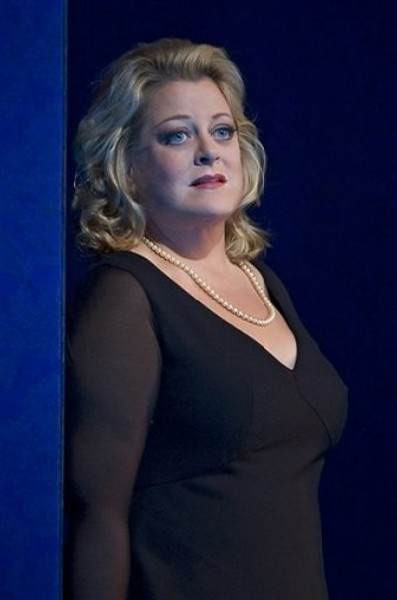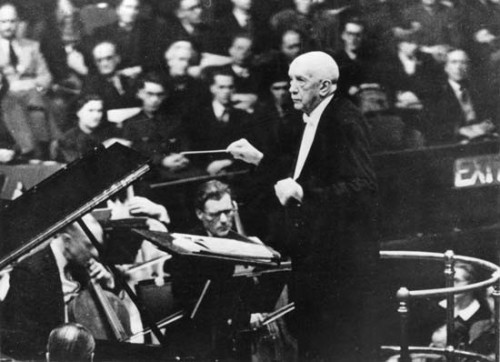Strauss' Elektra at the Metropolitan Opera
Conducted by Fabio Luisi with Susan Bullock
By: Susan Hall - Dec 16, 2009
Elektra
An opera in one act by Richard Strauss
Libretto by Hugo von Hofmannsthal, based on the tragedy by Sophocles;
Conductor, Fabio Luisi
Production by Otto Schenk..
Cast: Elektra, Susan Bullock; Chrysothemis, Deborah Voight; Klytamnestra, Felicity Palmer.
The Metropolitan Opera
December 10, 2009.
On December 10, Richard Strauss' Elektra had its season premier at the Metropolitan Opera in New York, Fabio Luisi conducting. The opera as tone poem was conducted with much passion and clarity. The score is unrelenting, powerful, but also vulgar and unembarrassed. That was how it was played. It was a thrilling evening.
Conducting is no small feat in this Strauss opera composed for an orchestra of 104 instruments: 20 brass, 20 woodwinds and 62 strings, the most instruments deployed in any opera, although Wagner in the "Ring" comes close. Strauss is quite different from Wagner, because he uses the orchestra to break up the whole, splash on color, extend the tessitura and take details to the edge of virtuosity.
Elektra's high C, for instance, was beautifully rendered by soprano Susan Bullock, making her Metropolitan Opera debut. Bullock has said, "I lived the life of a hermit. I couldn't relax by watching TV or anything. I just stared at the wall. Because it is a very weird thing to be thinking about on a daily basis – murdering your mother, murdering your stepfather and the death of your own father. Now I'm getting better at dealing with it, but it still takes me over."
Strauss himself at an early rehearsal yelled out to the conductor, "Louder, louder, I can still hear the voices." Perhaps Bullock's voice, drowned out by the orchestra, may be the fulfillment of the composer's intent. Or a light soprano who, after twenty years of singing lyric roles, found a large voice, which isn't quite large enough? This is difficult to determine.
Luisi in any case succeeded holding the opera's disparate parts together. This is not Salome with its bizarre eroticism driven by a clean sensuality. Elektra is obsessed with vengeance, and it is the opera's star.
In Elektra's lyric moments, particularly in the reunification scene with her brother Orest, Bullock's tessatura was lovely and right on. Repeated phrases in mourning Orest, who supposedly has died after he fell off his chariot and was smashed by its wheels, were wrenching. In scenes where the line is more strident and shocking, Bullock does not quite succeed. But then, this is one of the most difficult roles in all of opera and Bullock often pulls off the bare fifth which characterizes her bleak mood.
Enough discussion of the most taxing of dramatic soprano roles, in the most difficult opera in the repertory. It is a difficult but astounding opera for the audience - unusually brutal and bloody - but a great example of music's capacity to represent the extremes of human emotion. That's where the difficulty lies and the attempt to render the emotions in the voice as well as the orchestra is well worth hearing.
The role of Chrysothemis is loaded with the high notes Strauss liked so much for sopranos, including 5 B-flats. The tragic story does contain a comic cry by Chrysothemis when she rushes onto the scene where her mother has cried out two bloody screams as she was being murdered. She sings, "Es must etwas geschehen sein" ("Something must have happened"). Ah, yes.
Klytämnestra's role is mostly on the staff or just above – the part is after all written for a mezzo-soprano. The central scene is the confrontation between Klytamnestra and Elektra. Klytamnestra, mistakenly sensing that her daughter is in a calmer, more reasonable mood, begs for insights into her own sleepless nights. (Turns out there's no sex and a lot of guilt). Both the mother and Elektra sing bi-tonally, but the chromatic and dissonant switches from the key signatures are only around the edges and remain comfortable. This passage is not as daring as its composition suggests and is wonderfully accessible to listeners.
Felicity Palmer gave a vivid performance as the murderous queen, Klytamnestra, although she tipped from time to time into cartoon – more like a witch than a woman tortured by her complicity in the murder of her husband. She did deliver wonderful moments, like the phrase "Das klingt mir so bekannt, Und nur als hätt' ich's vergessen, lang und lang" (It sounds so familiar, as though it were something I'd forgotten long, long ago).
Groups of servants have scenes to themselves and often comment with insight and wisdom lacking in their royal masters on the events of the drama. Strauss thought this commentary was a good idea -- giving the unsophisticated view of the Man on the Street. The group at the Met, an odd take on the Greek chorus, was striking.
Deborah Voight is a classic Chrysothemis. It is unfair to compare her with Elektra, because her role lets her dominate the orchestra and she often gets to sings beautiful passages - she begs her sister to give up her vengeful obsession and rejoin life. It can offer men, children and most especially freedom . That is if you're not locked up in a courtyard by a mother, who fears what will happen if her daughters are set free! Chrysothemis does have to sing over winds that are doubled and even quadrupled and a nine part string texture sometimes called a golden churn -- ordinary, but nonetheless a mountain for Chrysothemis to climb. Voigt does it.
Hildgarde Behrens' performance is the standard for the title role, and this season's production is dedicated to her. In the long monologue in which Elektra sings about baths and fumes and the steam of blood, Behrens sang between a bass-clarinet lower register and high notes wth the power of a trumpet. She kept all the pieces together while restoring honor of the House of Atreus.
Voight, on the Met's Saturday radio broadcast, avoided commenting on Bullock's performance. She said over and over that she enjoyed watching Bullock because she intended soon to perform the Elektra role herself. An event which we eagerly anticipate.
The final notes sung by Elektra as she dances herself to death, are to the text "tanzenWer glücklich ist wie wir, dem ziemt nur eins: schweigen und tantzen!" ("There is only one thing fitting for those happy as we: to be silent and dance!"). The last syllable is a low F#. Behrens sings this note and if Bullock did, it went unheard. Maybe Voight? Whoever sings, this opera never leaves you.




